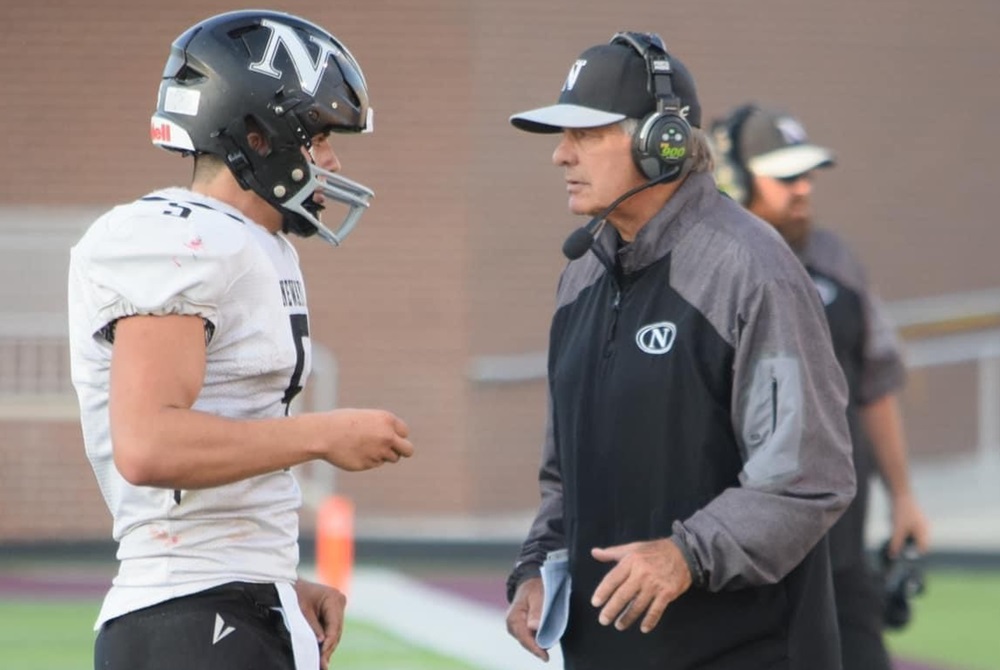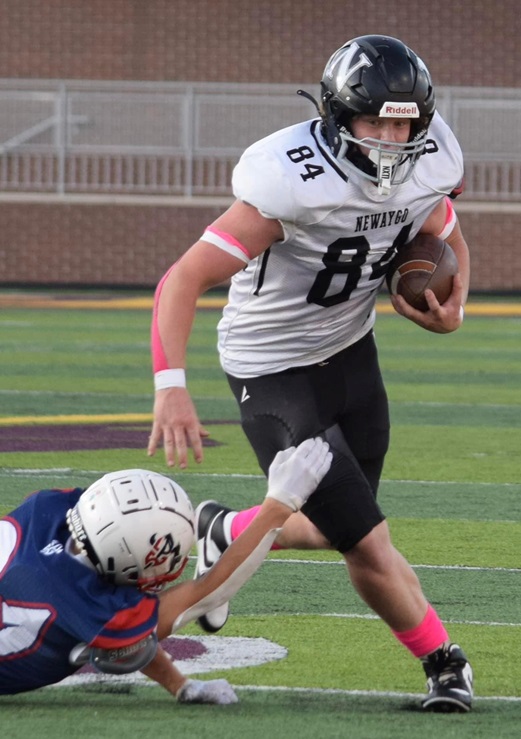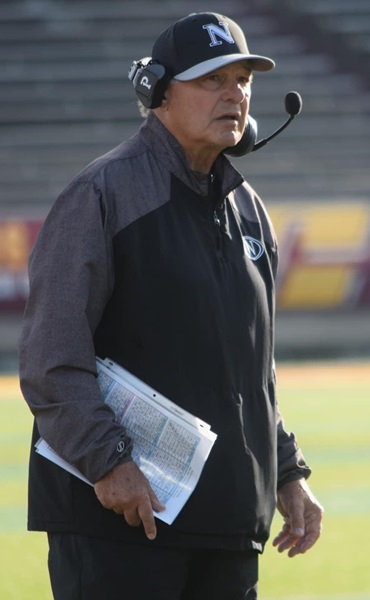
'22 Game' Lasts 2 Plays, Lives on
By
Ron Pesch
MHSAA historian
October 26, 2015
What would you do with 22 seconds to right a wrong?
In Michigan, the longest football game in high school sports history was played on September 23, 1977 when Detroit Southeastern defeated Detroit Northeastern 42-36 in nine overtimes.
But what is the shortest?
On the evening of Thursday, Nov. 5, 1953, Eaton County foes Bellevue and Vermontville squared off in a Tri-C Conference battle. It was a home contest for Vermontville, but without illumination at its field, the game was staged just west beneath the lights at Nashville High School in Barry County.
The dominant team in Tri-C play over the previous three years, Bellevue’s Broncos had posted three consecutive undefeated seasons from 1950 and 1952. However, graduation took its toll and with only five returning veterans in the fall of 1953, Bellevue lost its nonconference season opener to Homer. The Broncos had also dropped a pair of league contests, to Lake Odessa and Olivet, just prior to the Vermontville game, and entered with a 4-3 record.
Vermontville brought a 4-2 mark into the contest, and was in a four-way tie with Bellevue, Nashville and Lake Odessa for second in the conference.
The Broncos and Wildcats were evenly matched and played to a scoreless tie in the first half. Vermontville opened up a 6-0 lead on a 20-yard end sweep by the Wildcats’ quarterback Pete Benton in the third quarter, but entered the final minutes of the game trailing 12-6 thanks to a TD run by Bellevue’s Jim Smith and an early-fourth quarter scoring pass from Smith to Bob Babbitt.
Coach Dave McDowell’s Wildcats mounted a long final drive, and fans strapped in for a thrilling finish. Pushing deep into Bellevue territory, Vermontville faced a fourth down and eight from the 16-yard line with under a minute to play when Benton launched a desperation pass to the end zone.
The pass fell incomplete, but Bellevue was flagged for pass interference. Officials stepped off the penalty and awarded Vermontville the ball at the one-yard line, but the Wildcats’ plunge into the line fell an inch short on what was called a repeated fourth down play. Vermontville took possession and ran out the clock.
Following the game, Coach McDowell protested the ruling to officials, correctly stating that his team should have been awarded an automatic first down and goal from the 1-yard-line on the penalty, according to high school rules. Appealing the call, the situation was brought to the attention of the league, MHSAA executive director Charles Forsythe and the MHSAA athletic board.
On Wednesday, Nov. 11, the state athletic board agreed an error had been made, but did not order a replay. Instead, they noted three possible solutions:
- Result left as it was.
- Called a no contest.
- Replay it at the point of infraction.
The board moved a final decision back to the league. Because of the possible impact on the final conference standings, and eventually, the awarding of the league’s all-sports trophy, the Tri-C Conference opted to replay the contest from the point of infraction – the 1-yard line – with 22 seconds placed on the clock.
 The news of the league’s decision was blasted out by the news services nationwide, and immediately, the pending replay of a small town contest captured the imagination of reporters and sports fans across the United States.
The news of the league’s decision was blasted out by the news services nationwide, and immediately, the pending replay of a small town contest captured the imagination of reporters and sports fans across the United States.
“Shortest ‘Game’ in History?” read the headline in the Lexington, Kentucky Herald. From Biloxi, Mississippi, to Boston, Massachusetts, from Rockford, Illinois to Omaha, Nebraska and Seattle Washington, sports aficionados read the news about the error. Best of all, details flowed forth on the plan to replay critical seconds that might alter the result, fulfilling every fan’s dream.
So began the longest huddle in history.
“What would you do?” was the question on the lips of coaches and followers in barber shops and factories. Detroit Free Press writer George Puscas asked that very question to some of Michigan’s top coaches.
Detroit Lions coach Buddy Parker offered his advice to Vermontville’s coach McDowell.
“The other team will be expecting a run,” noted Parker, “so I would fake a run off tackle then throw a pass in the other direction – with three receivers downfield.”
Michigan State’s legendary Biggie Munn stated the obvious:
“Call a scoring play.”
University of Michigan head coach Bennie Oosterbaan was tied up preparing for the Wolverines’ upcoming contest with MSU, so instead U-M end coach Bill Orwig weighed in with a tongue-in-cheek recommendation:
“Take the time out.”
Earl “Dutch” Clark, in charge at the University of Detroit, suggested that McDowell diagram “two of the most unusual offensive formations … anything to confuse the defense. The first play should be a running play and if it didn’t work, take time out then try again.”
Wayne University’s coach Lou Zarza was the most specific of them all.
“On a goal line stand, the defense usually drifts toward the middle. So I would fake the ball to the right halfback on a slant, then send the fullback with the ball wide to the right, outflanking the defense. It’s a good goal line play on the T formation.”
Suggestions came from all over. A gentleman in Syracuse, New York, even penned a personal letter to McDowell with a sure-fire suggestion.
Three days after the 1953 prep season had officially ended, on the afternoon of Monday, Nov. 16, the same officiating crew and the Vermontville and Bellevue squads emerged and again travelled to Nashville to line up for what can arguably be called the shortest – or perhaps the longest – game in high school football history.
Reporters from Detroit, Grand Rapids, Lansing and Battle Creek converged on the city for 22 seconds of football. High school reporting legends Hal Schram of the Detroit Free Press, Bob Hoerner of the Lansing State Journal, George Maskin of the Detroit Times, Harry Stapler of the Detroit News and writers from the Associated Press and United Press International all descended upon mid-Michigan, “almost as if the Rose Bowl was to be played.”
“That game brought more publicity to coach Gordon Korstange’s 6-3 squad then his teams received for posting three consecutive unbeaten seasons in 1950, 1951 and 1952,” recalled 80-year old Burton H. Brooks, who was the only reporter who had covered the original contest, and one of many covering the replay. A graduate of Bellevue, he was a freshman at Michigan State at the time, earning money as a sports stringer for the Bellevue Gazette and Charlotte Republican Tribune.
Beneath sunny skies, “a crowd of over 500 fans and curiosity seekers, most of them attired in shirt sleeves, lined the field on both sides near the east end of the Nashville gridiron,” wrote Brooks, many years later. “At 5:00 the shrill blast of an official’s whistle split the air, announcing time for the game.”
Attendance was way up from the original contest, and in an unusual move for the time, Kalamazoo television station WKZO announced that they would send a crew to Nashville and then televise the game – (all 22 seconds of it!) – Tuesday evening. In addition, 10 newspaper photographers were on site to capture images from the game.
While the size of the crowd was up, turnout on the football squads had decreased. Vermontville dressed its full squad of 24 for the showdown, but kept out two regular tackles and his first-string quarterback, as all had been on the injured list at the end of the first clash.
Meanwhile, Bellevue brought only 14 players.
“Just our defensive unit and enough to run back the kickoff,” Korstange told the Lansing State Journal, prepared for a situation that could arise if Vermontville scored.
“Three of the defensive starters had decided to go deer hunting instead,” said Brooks discussing the shortened game, “so Bellevue needed to call up some kids for the game from the junior varsity squad.”
“Bellevue won its sixth game of the year, downing Vermontville in a sensational goal line stand in the famous ‘22’ Game” at Nashville last Monday,” wrote Brooks in the Bellevue Gazette. “Coach Dave McDowell’s Wildcats ran two plays against Bellevue, but couldn’t dent the solid Bronco defense. On the first play the Wildcats sent big Bob Steward up center, but he was driven back a yard by the entire center of the Bellevue line.”
 Following a timeout, the Green and White tried to sneak quarterback Pete Benton across the line to the left of center as the ball carrier on the second play, but the hole was quickly plugged by tackle Donald Rogers and guard Jerry Babbitt. Steward had been stopped by Bellevue guard Wayne Lesser. Dale Spotts, Bob Babbitt, Harold Messenger, Ralph Hales, Dick Moon, Jim Smith, Gordon Smith, and Ed Bessemer filled the other defensive spots and ensured the result of the first game went unchanged.
Following a timeout, the Green and White tried to sneak quarterback Pete Benton across the line to the left of center as the ball carrier on the second play, but the hole was quickly plugged by tackle Donald Rogers and guard Jerry Babbitt. Steward had been stopped by Bellevue guard Wayne Lesser. Dale Spotts, Bob Babbitt, Harold Messenger, Ralph Hales, Dick Moon, Jim Smith, Gordon Smith, and Ed Bessemer filled the other defensive spots and ensured the result of the first game went unchanged.
Once again, the wire services blasted their report from sea to shining sea.
“Officials Didn’t Rob Vermontville Team” screamed the headline in the Miami Daily News. Beneath an AP photo, residents of the Florida town were treated to a detailed account of the contest.
“Prep Grid Game Ends Same Way Following 11-Day Break” read the caption in the Dallas Morning News in football-crazed Texas.
“Replayed Grid Game Ends with the Same Result as Before,” read the headline in the Seattle, Washington, Daily Times.
As noted at the time, it certainly wasn’t the first, nor would it be the last, that a refereeing crew made a mistake in a game. Fans then, like now, were reminded officials are only human.
Bellevue ended the extended season in a tie for second with Lake Odessa, with 5-2 marks. For the first time in league history the Tri-C gridiron championship was awarded to Olivet, which, at 8-0, posted its first unbeaten season and, as it turned out, unseated Bellevue for the league’s 1953-54 all-sports trophy.
More than 60 years later, a forgotten showdown between high school football teams, played out before national attention in little Nashville, Michigan, still stands as one of the most entertaining and unusual sports moments in the history of America.
 Ron Pesch has taken an active role in researching the history of MHSAA events since 1985 and began writing for MHSAA Finals programs in 1986, adding additional features and "flashbacks" in 1992. He inherited the title of MHSAA historian from the late Dick Kishpaugh following the 1993-94 school year, and resides in Muskegon. Contact him at [email protected] with ideas for historical articles.
Ron Pesch has taken an active role in researching the history of MHSAA events since 1985 and began writing for MHSAA Finals programs in 1986, adding additional features and "flashbacks" in 1992. He inherited the title of MHSAA historian from the late Dick Kishpaugh following the 1993-94 school year, and resides in Muskegon. Contact him at [email protected] with ideas for historical articles.
PHOTOS: (Top and below) What's believed to be a Battle Creek Enquirer photo shows one of the goal line stands by the Bellevue defense against Vermontville. (Middle) The Lansing State Journal reported on the nationwide reporting of the "22-second game."

Back to Building Boys Into Men, Munger Bringing Newfound Success to Newaygo
By
Tom Kendra
Special for MHSAA.com
November 6, 2024
NEWAYGO – After a long, physical practice Tuesday, as the light rain started to intensify, Newaygo coach Ralph Munger decided to squeeze in a quick game of “Simon Says.”
 Within a few minutes, players were laughing, making fun of each other for clapping their hands when Munger didn’t say the magic words (and doing five push-ups as punishment) – and learning mental focus in the process.
Within a few minutes, players were laughing, making fun of each other for clapping their hands when Munger didn’t say the magic words (and doing five push-ups as punishment) – and learning mental focus in the process.
“He’s an old-style coach,” said Newaygo senior Henry Wood, a senior captain and two-way starter. “But he has a crazy passion for the sport, and his football IQ is insane.”
Simon Says is just one of proven techniques the longtime coach is using to teach and motivate his players at Newaygo, which is 8-2 and hosting Central Montcalm on Friday for a Division 6 District championship in just his second year as coach.
Munger, 72, is having a ball at his latest coaching stop and is up to 11 wins over his two years at Newaygo, a small, rural school northwest of Grand Rapids – after winning 80 games in 11 years at Frankenmuth and 255 games over 28 years at Rockford, the latter tenure including five Finals appearances and three titles. He entered this season the sixth-winningest coach in state football history, and heading into this weekend his career record is 343-117.
“We’re making strides, and things are starting to click,” said Munger, who was an all-state football player in his own right at Frankenmuth in the late 1960s. “I feel pretty good, and I thank God every day that he has allowed me to coach again.”
 Newaygo knocked off traditional Division 6 power Montague, 30-17, last week for the school’s first playoff win since 2018.
Newaygo knocked off traditional Division 6 power Montague, 30-17, last week for the school’s first playoff win since 2018.
The Lions are doing it with Munger’s beloved power game, led by senior quarterback Blake Kerr (55-of-99 passing for 805 yards and 10 TDs), junior running back Porter Slominski (130 rushes for 934 yards and 13 TDs) and senior running back Ethan Reyburn (104 rushes for 673 yards and 8 TDs).
Kerr, who has good size at 6-foot-2 and 200 pounds, has thrown primarily to his two fellow senior captains in split end Hunter Yearsovich (18 catches for 255 yards and 3 TDs) and Wood (9 catches for 140 yards and 3 TDs).
Luis Ceja Alvarez (5-10, 155), is a crafty, undersized linebacker who leads the defense with 34 solo tackles and 52 assists. Fellow linebacker Xavier Stroud has 17 solos and 32 assists.
Yearsovich, a team leader and two-way starter with a 4.4 GPA, said he and his senior teammates had an immediate connection with their Hall of Fame coach.
“I’ll never forget when we met him in the gym last year because he talked to us like we were men,” said Yearsovich. “With him, we don’t ever have the mentality that we’re going to lose, no matter who we’re playing. It hasn’t always been like that around here.”
As the Lions broke into groups in the middle of Tuesday’s practice, Munger headed off with the defensive backs.
The joy of hands-on coaching was apparent as he schooled them on back-pedaling and cutting on what could be a muddy playing surface Friday night, and then concentrating and catching a wet ball.
Munger, who had quadruple-bypass, open-heart surgery in the summer of 2019 and has undergone three separate spine surgeries, is thankful to still be able to stalk the sidelines with a whistle around his neck. He endured one long autumn away from coaching, during the COVID year of 2020, which is when he knew he wasn’t done.
“I was going stir crazy,” said Munger with a grin. “I needed my football fix, anywhere.”
 That led him to tiny Mancelona High School, which is near his cabin in northern Michigan, where he helped coach the offensive and defensive lines in 2021 and 2022. He then in 2023 pursued and landed the Newaygo head coaching job, which is a 30-minute drive from his home in Rockford.
That led him to tiny Mancelona High School, which is near his cabin in northern Michigan, where he helped coach the offensive and defensive lines in 2021 and 2022. He then in 2023 pursued and landed the Newaygo head coaching job, which is a 30-minute drive from his home in Rockford.
He led Newaygo to a fairly typical 3-6 record last year. But with a full year of his coaching under their belts, the Lions are enjoying a breakthrough fall.
Newaygo finished the regular season 7-2, with the only losses coming against Reed City and Big Rapids, who are both still alive in the playoffs. One of the wins came against this week’s playoff opponent, Central Montcalm, 21-12, in Week 2.
Another victory over CM would earn the Lions yet another home game, against the winner of Ovid-Elsie at Lansing Catholic, this time for a Regional championship. Newaygo has never won a football Regional title, and 2012 was the only year it won more than one playoff game, losing to Grand Rapids West Catholic in a Division 5 Regional Final.
Munger said, at this point in his life, his only goals are to bring some positive energy to Newaygo and help his players make the transition from boys to men – the same thing he has been doing for almost 50 years.
“I am enjoying myself, very much so,” said Munger, who is a member of six Halls of Fame for his coaching achievements. “I find it fun getting after all the challenges out here. That’s what drives me.
“That’s the calling that the Good Lord has given me.”
 Tom Kendra worked 23 years at The Muskegon Chronicle, including five as assistant sports editor and the final six as sports editor through 2011. E-mail him at [email protected] with story ideas for Muskegon, Oceana, Mason, Lake, Oceola, Mecosta and Newaygo counties.
Tom Kendra worked 23 years at The Muskegon Chronicle, including five as assistant sports editor and the final six as sports editor through 2011. E-mail him at [email protected] with story ideas for Muskegon, Oceana, Mason, Lake, Oceola, Mecosta and Newaygo counties.
PHOTOS (Top) Newaygo varsity football coach Ralph Munger, right, talks things over with his senior quarterback Blake Kerr during a 53-26 win over Lake Odessa Lakewood on Oct. 18 at Central Michigan’s Kelly-Shorts Stadium. (Middle) Senior tight end Henry Wood (84) works to get past an outstretched defender. (Below) Munger, play sheet in hand, has led the Lions to an 8-2 record. (Photos by Tashina Kerr.)

